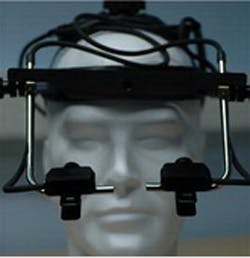Eye test for Alzheimer's disease
UK researchers have demonstrated that people with Alzheimer's disease have difficulty with one particular type of eye-tracking test.
The fact that a simple eye-tracking test could hold the key to earlier Alzheimer's diagnosis is an important finding, according to Dr. Trevor Crawford from Lancaster University (Lancaster, UK), who led the research with colleagues from Royal Preston Hospital, Lancashire Teaching Hospitals NHS foundation trust.
Crawford noted that results from the work demonstrated, for the first time, a connection with the memory impairment that is often the first noticeable symptom in Alzheimer's disease.
"The diagnosis of Alzheimer's disease is currently heavily dependent on the results of a series of lengthy neuropsychological tests," Crawford says. However, patients with a dementia often find that these tests are difficult to complete due to a lack of clear understanding and lapse in their attention or motivation.
Over the last 10 years, researchers in laboratories around the world have been working on an alternative approach based on the brain's control of the movements of the eye as a tool for investigating cognitive abilities such as attention, cognitive inhibition and memory.
In a study at Lancaster University, 18 patients with Alzheimer's disease, 25 patients with Parkinson's disease, 17 healthy young people and 18 healthy older people were asked to follow the movements of light on a computer monitor, and in some instances they were asked to look the opposite way, away from the light.
The research group found stark contrasts in the eye-tracking measurements taken from the research sample.
In particular, patients with Alzheimer's made mistakes when they were asked to look away from the light despite the fact that they were able to respond perfectly normally when they were asked to look towards it. These uncorrected errors were 10 times more frequent in the Alzheimer's patients compared to the control groups.
Crawford believes that, in the future, such light tracking technology could play a vital role in the diagnosis of the disease.
Recent articles on Alzheimer's disease that you might also be interested in.
1. Arterial spin labeling technique uses MRI to diagnose Alzheimer's
Researchers from the Perelman School of Medicine at the University of Pennsylvania (Philadelphia, PA, USA) are using a magnetic resonance imaging (MRI) technique called arterial spin labeling (ASL) to diagnose Alzheimer's disease.
2. MRI maps the development of the brain
Working in collaboration with colleagues in South Korea, scientists at Nottingham University (Nottingham, UK) aim to create a detailed picture of how the Asian brain develops, taking into account the differences and variations which occur from person to person.
3. Image sensor detects pH
A new imaging sensor developed by Kazuaki Sawada from the Toyohashi University of Technology (Toyohashi Tech; Toyohashi, Aichi, Japan) may lead to new methods for the treatment of Alzheimer's disease.
-- Dave Wilson, Senior Editor, Vision Systems Design
